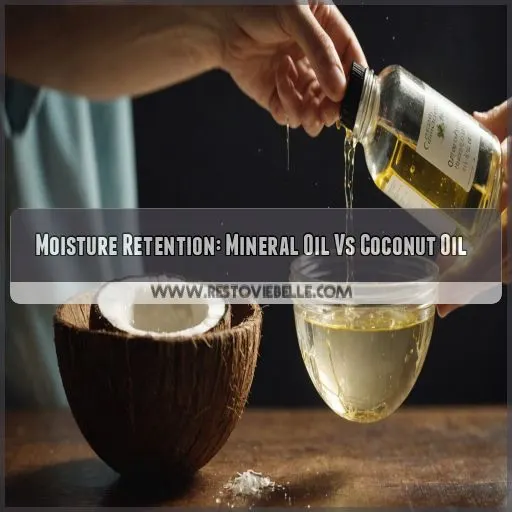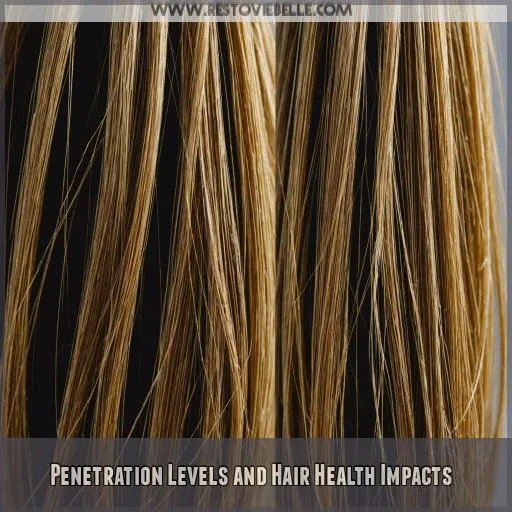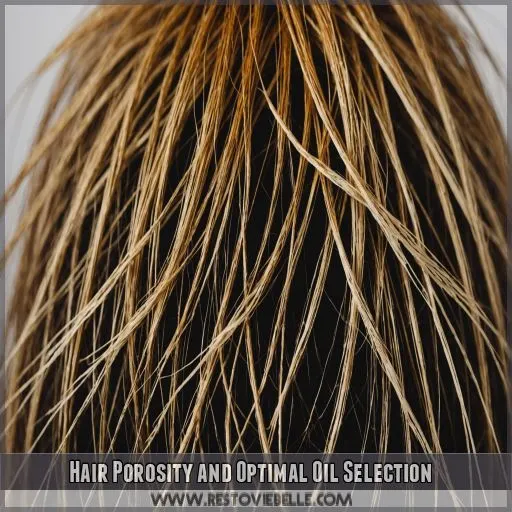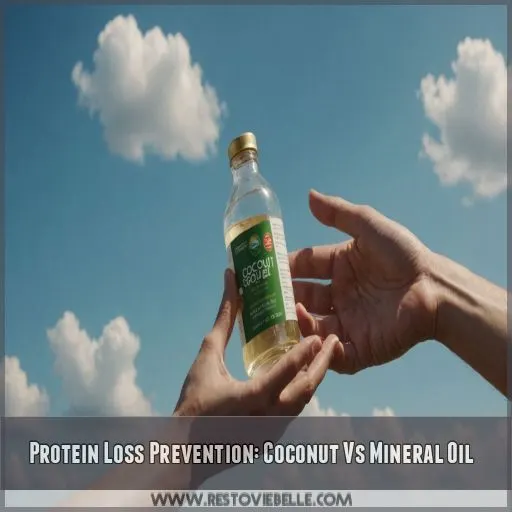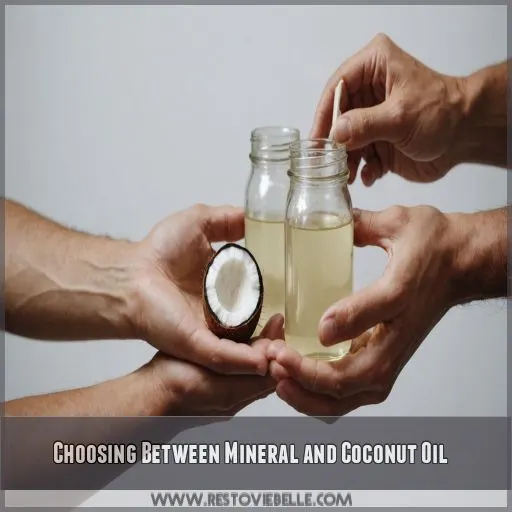This site is supported by our readers. We may earn a commission, at no cost to you, if you purchase through links.
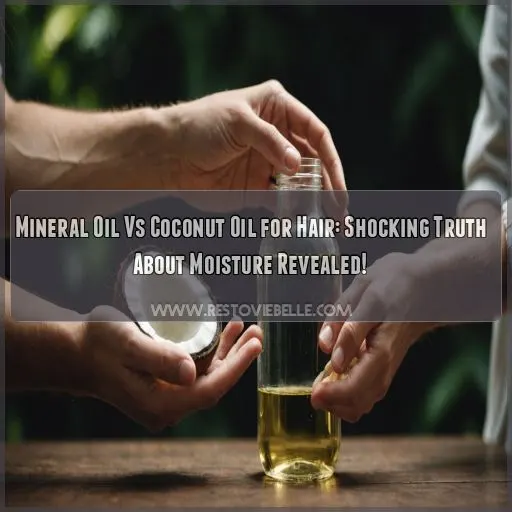
Mineral oil creates a protective barrier, sealing in moisture and fighting frizz like a champ. It’s your hair’s personal bodyguard against humidity.
Coconut oil, on the other hand, is more of an inside job. It penetrates the hair shaft, bringing moisture and protein-rich goodness along for the ride.
Your hair type plays a big role in which oil will work best for you. High porosity hair? Mineral oil might be your new BFF. Low porosity locks? Coconut oil could be the key to realizing your hair’s potential.
Ready to dive deeper into the slick world of hair oils?
Table Of Contents
- Key Takeaways
- Moisture Retention: Mineral Oil Vs Coconut Oil
- Penetration Levels and Hair Health Impacts
- Hair Porosity and Optimal Oil Selection
- Protein Loss Prevention: Coconut Vs Mineral Oil
- Choosing Between Mineral and Coconut Oil
- Frequently Asked Questions (FAQs)
- Is mineral oil better than coconut oil?
- Is mineral oil good for hair?
- What is the disadvantage of mineral oil for hair?
- Which oil is better than coconut oil for hair?
- How do these oils affect hair color retention?
- Can mineral or coconut oil cause scalp acne?
- Which oil is better for taming split ends?
- Do these oils impact hair growth rates?
- How do mineral and coconut oils affect heat styling?
- Conclusion
Key Takeaways
- You’re not alone in the mineral oil vs. coconut oil debate – it’s like choosing between a raincoat and a moisturizer for your hair! Mineral oil creates a protective barrier, while coconut oil penetrates deep into your strands. Your hair type is the key to unlocking which one is your perfect match.
- Don’t let high humidity turn you into a frizz monster! Mineral oil is your go-to superhero cape for fighting frizz, while coconut oil is more of a temporary spa treatment. If you’re battling the frizzies, mineral oil might just be your new best friend.
- Your hair’s porosity is the secret ingredient in this oily recipe. If you’ve got high-porosity hair that drinks up moisture like a camel in the desert, mineral oil could be your savior. But if your locks are more "hard to get into" than an exclusive nightclub, coconut oil might be the VIP pass you need.
- When it comes to preventing protein loss, coconut oil is the reigning champion. It’s like a bouncer for your hair, keeping those precious proteins locked in tight. Mineral oil, on the other hand, is more of a surface-level smooth operator. If you’re looking to strengthen your strands from the inside out, coconut oil has got your back.
Moisture Retention: Mineral Oil Vs Coconut Oil
You’ve probably wondered which oil is better for your hair: mineral or coconut? Let’s uncover the surprising truth about how these oils affect moisture retention and frizz control in your locks.
Mineral Oil’s Protective Barrier
You’ve probably heard the buzz about mineral oil for hair. Here’s the scoop: it’s like a superhero shield for your locks, especially in dry climates. This protective barrier:
- Locks in moisture
- Fights frizz
- Guards against humidity
- Keeps your style sleek
Coconut Oil’s Temporary Moisture Effects
While mineral oil creates a lasting shield, coconut oil’s moisture magic doesn’t stick around forever. It’s like a short-term spa treatment for your locks. Check out this handy guide to see how it measures up:
| Hair Type | Coconut Oil Effect | Duration |
|---|---|---|
| Straight | Silky smooth | 1-2 days |
| Wavy | Soft and bouncy | 2-3 days |
| Curly | Defined and hydrated | 3-4 days |
Frizz Control in High Humidity
While coconut oil’s effects fade, mineral oil shines in high humidity. It’s like a superhero cape for your hair, fighting frizz when the weather turns muggy. Here’s why it’s your new best friend:
- Seals moisture in
- Blocks humidity out
- Keeps hair smooth
- Prevents flyaways
- Lasts longer than coconut oil
Water Transport Through Hair Cuticle
You might be surprised to learn that coconut oil and mineral oil affect your hair’s moisture differently. Let’s break it down:
| Property | Coconut Oil | Mineral Oil |
|---|---|---|
| Cuticle Penetration | High | Low |
| Water Transport | Allows | Blocks |
| Frizz in Humidity | Possible | Reduced |
Think of coconut oil as a sponge and mineral oil as an umbrella for your hair!
Penetration Levels and Hair Health Impacts
You might think all hair oils are created equal, but when it comes to coconut and mineral oil, their effects are worlds apart. Let’s uncover how these oils interact with your hair at a molecular level and what that means for your locks’ health and appearance.
Coconut Oil’s Affinity for Hair Proteins
Your hair’s secret admirer? Coconut oil! It’s got a thing for your hair’s proteins, sneaking past the bouncer (your hair cuticle) to cozy up with keratin. This love affair means stronger, softer locks that won’t ghost you after washing.
Mineral Oil’s Surface-Level Application
Unlike its coconut cousin, mineral oil stays on your hair’s surface. It’s like a protective shield, sitting pretty atop your strands. While it won’t dive deep, this surface-level application can still work wonders in your hair care regimen.
Effects on Hair Softness and Flexibility
You’ll notice a difference in how these oils affect your locks. Here’s what happens:
- Coconut oil dives deep, softening from within
- Mineral oil stays on top, smoothing the surface
- Your hair’s flexibility improves with coconut
- Surface shine? Mineral oil’s got you covered
Keratin Retention and Protein Loss Prevention
You’ve got a secret weapon in coconut oil for keeping your hair strong. It’s like a bouncer for your locks, preventing protein loss and holding onto keratin. This means less hair breakage and more growth potential.
Hair Porosity and Optimal Oil Selection
Your hair’s porosity plays a big role in determining which oil will work best for your locks. Understanding whether you have high or low porosity hair can help you choose between mineral oil and coconut oil, ensuring you get the moisture and protection your strands truly need.
High Porosity Hair Considerations
If your hair’s like a sponge, soaking up everything, you’ve got high porosity hair. It’s thirsty for moisture but can get greasy fast. Mineral oil might be your new best friend, creating a protective barrier without overdoing it.
Low Porosity Hair Benefits
If you’ve got low porosity hair, you’re in luck! Coconut oil’s your new best friend. It’ll sneak past those tight cuticles, hydrating your locks from the inside out. Say goodbye to dry, lifeless hair and hello to moisture retention!
Balancing Moisture and Protein Needs
Balancing moisture and protein is key for healthy hair. Your hair type plays a big role in choosing the right oil. Here’s what you need to know:
- Coconut oil: Great for protein-rich benefits
- Mineral oil: Locks in moisture
- Hair masks: Boost hydration
- Diet: Affects hair health from within
Avoiding Greasiness and Limp Hair
You’ve got the moisture and protein balance down, but what about avoiding that greasy, limp look? It’s all about your hair’s porosity. For high-porosity hair, stick to lighter oils or dilute them. Low-porosity? You might need less frequent applications.
Protein Loss Prevention: Coconut Vs Mineral Oil
You might be surprised to learn that not all hair oils are created equal when it comes to preventing protein loss. Let’s explore how coconut oil and mineral oil compare in this important aspect of hair care, and why it matters for your luscious locks.
Coconut Oil’s Pre-Wash and Post-Wash Benefits
- Locks in moisture like a champ
- Fights protein loss tooth and nail
- Keeps your locks strong as steel
- Leaves your mane shining like a diamond
Mineral Oil’s Limited Protein Loss Prevention
While coconut oil’s a superstar at preventing protein loss, mineral oil’s just not in the same league. It’s like comparing a superhero to a regular Joe. Check out this comparison:
| Aspect | Coconut Oil | Mineral Oil | Sunflower Oil |
|---|---|---|---|
| Protein Loss Prevention | High | Low | Low |
| Hair Penetration | Deep | Surface | Surface |
| Moisture Retention | Moderate | High | Low |
| Long-term Benefits | Yes | Limited | Limited |
Damaged Hair Treatment Effectiveness
For treating damaged hair, coconut oil is a top choice. Unlike mineral oil, it’s a protein loss prevention powerhouse. Here’s why it’s your hair’s new BFF:
- Penetrates deeply
- Bonds with hair proteins
- Reduces washing damage
- Strengthens from within
Long-Term Hair Strength Implications
Beyond immediate effects, let’s consider long-term hair strength. Your hair’s future depends on protein retention. Here’s a quick comparison:
| Factor | Coconut Oil | Mineral Oil |
|---|---|---|
| Protein Loss | Minimal | Moderate |
| Hair Growth | Promotes | Neutral |
| Scalp Health | Nourishes | Protects |
Coconut oil’s a clear winner for keeping your locks luscious and strong.
Choosing Between Mineral and Coconut Oil
Choosing between mineral oil and coconut oil for your hair can feel like a beauty-aisle showdown. Let’s break down the key differences so you can pick the perfect oil for your luscious locks, whether you’re battling frizz or craving some serious shine.
Frizz and Flyaway Control
For taming frizz and flyaways, mineral oil’s your go-to. It creates a protective barrier that locks out humidity, keeping your hair smooth. But remember, your hair type matters! If you’ve got thick, curly locks, coconut oil might be your secret weapon.
Shine and Hydration Enhancement
Want to boost your hair’s shine and hydration? Here’s the scoop on choosing between mineral and coconut oil:
- Coconut oil: Your ticket to luscious, hydrated locks
- Mineral oil: The shine enhancer that won’t weigh you down
- Oil blends: The best of both worlds for your crowning glory
Thick and Curly Hair Considerations
If you’ve got thick, curly locks, coconut oil might be your new best friend. It penetrates deeply, nourishing those thirsty strands from within. Plus, it’s a champ at taming frizz and defining those beautiful curls you’re rockin’.
Experimenting for Individual Hair Needs
Ready to find your hair’s perfect match? Start your oil adventure! Test both mineral and coconut oil on different sections. Keep a hair diary to track results. Remember, what works for your bestie mightn’t work for you. Happy experimenting!
Frequently Asked Questions (FAQs)
Is mineral oil better than coconut oil?
Like choosing between a raincoat and a moisturizer, it depends on your hair’s needs. You’ll want mineral oil for frizz control and moisture retention, while coconut oil’s better for strengthening and hydrating. Experiment to find your hair’s perfect match!
Is mineral oil good for hair?
Mineral oil can be good for your hair, especially if you’re battling frizz. It’s like a protective shield, locking in moisture and keeping humidity at bay. Just don’t go overboard – a little goes a long way!
What is the disadvantage of mineral oil for hair?
You’ll find mineral oil doesn’t nourish your hair from within. It’s like a raincoat – great for protection, not so much for hydration. Plus, it can build up over time, leaving your locks feeling heavy and greasy.
Which oil is better than coconut oil for hair?
Picture your hair as a thirsty sponge. While coconut oil’s great, argan oil might be your mane’s new best friend. It’s lightweight, packed with nutrients, and won’t weigh you down. Give it a try—your locks may thank you!
How do these oils affect hair color retention?
Hair color retention‘s a tricky beast! While mineral oil acts as a shield, locking in color, coconut oil‘s a double-edged sword. It moisturizes but can open the cuticle, potentially fading your hue. Choose wisely for vibrant locks!
Can mineral or coconut oil cause scalp acne?
You’re not alone if you’re worried about scalp acne. Both oils can clog pores, potentially causing breakouts. But don’t panic! It’s not a guarantee. Your skin’s unique, so what works for others mightn’t work for you.
Which oil is better for taming split ends?
You’ll find coconut oil’s your best bet for taming those pesky split ends. It penetrates deep, nourishing from within. Plus, it’ll leave your locks feeling silky smooth. Just don’t go overboard – a little goes a long way!
Do these oils impact hair growth rates?
You’re probably wondering if oils can supercharge your hair growth. While they won’t turn you into Rapunzel overnight, they can create a healthier scalp environment. A happy scalp means happier, potentially faster-growing locks!
How do mineral and coconut oils affect heat styling?
Ironically, you’d think oils and heat would be a recipe for disaster. But they’re your hair’s secret weapon! Both protect against damage, but coconut oil can penetrate deeper, offering better heat protection. Choose wisely for your styling needs.
Conclusion
The battle of mineral oil vs. coconut oil for hair isn’t just about moisture – it’s about figuring out what your hair really needs.
Your unique locks hold the key to choosing your perfect oil match.
Don’t be afraid to experiment and listen to what your hair’s telling you.
With the right oil in your arsenal, you’ll be ready to face any hair challenge.
Your journey to luscious, healthy hair starts now!

